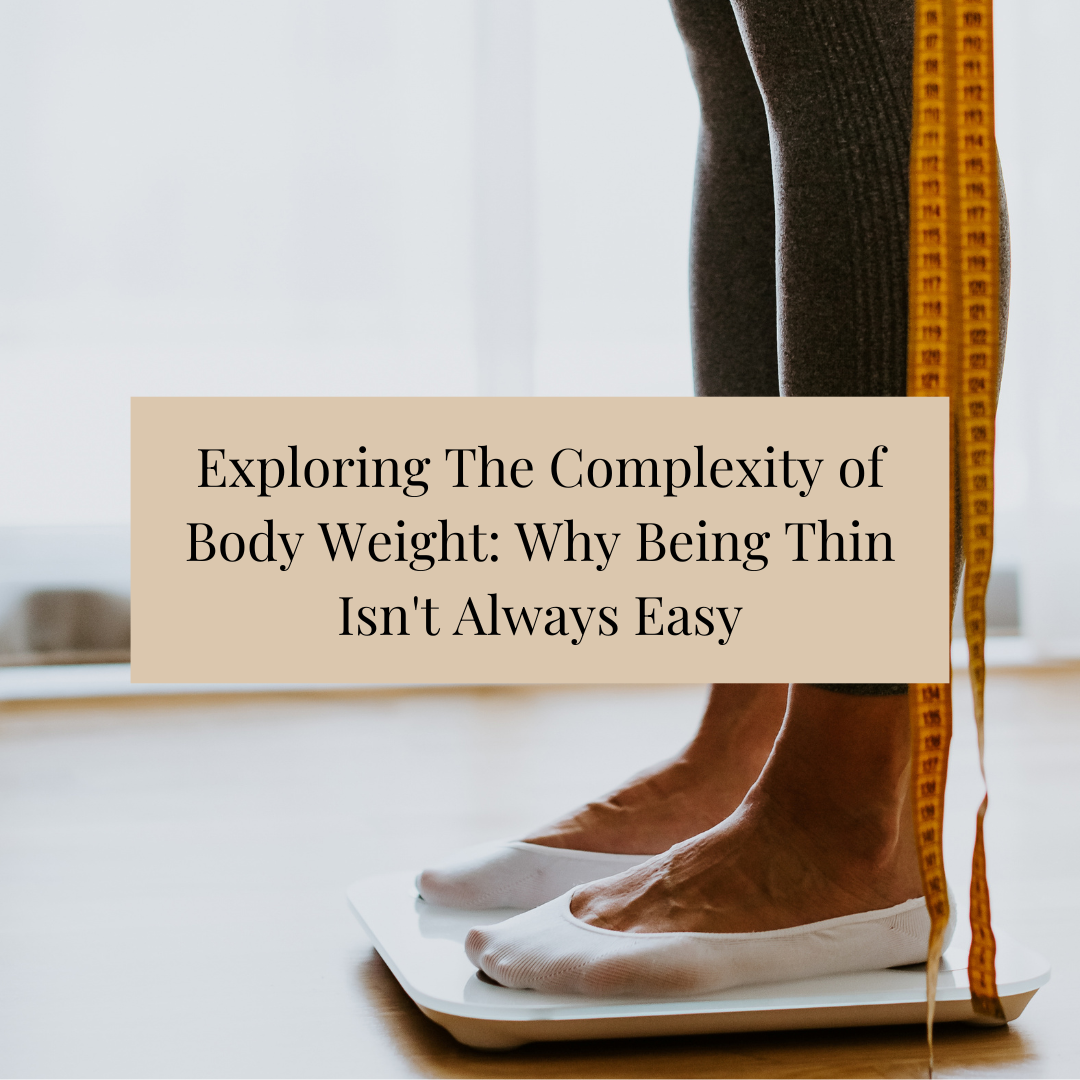Why Being Thin Isn’t Always Easy: Exploring The Complexity of Body Weight

It’s easier for some people to be thin than it is for others.
For some reason, this has become a controversial statement, but there is a huge body of evidence to support it. Let’s dive in.
What the Research Shows
Ultimately, body weight is determined by energy balance. This means, in simple terms, that the number you see on the scale is the result of calories in, calories out. If you eat more calories than you burn, you’ll lose weight. And if you burn more calories than you eat, you’ll gain weight.
But energy intake and output aren’t isolated metrics. They’re influenced by common factors like hunger, appetite, exercise habits, and occupation, as well as often overlooked factors including:
- neighborhood urbanization and safety
- technology advancements
- chronic illness
- medication use
- socioeconomic inequalities
- neural reactions to food stimuli
- genetics (and environmental impacts) of taste preference
- childhood upbringing
- trauma
Furthermore, the heritability of obesity has been estimated to be between 40 and 70% in twin, family, and adoption studies. If you’re born or adopted into a family with a history of obesity, there’s a good chance you’ll be obese, too.
All this to say, there’s a combination of factors at play across multiple domains that not only impact how much you eat and how much you move, but also make it easier (or more difficult) for you to make the choices that keep your weight in check.
This isn’t to say that hard work doesn’t matter or that working to establish healthy habits is pointless. And it’s certainly not to make excuses for people to neglect their health or make poor choices; it’s to illustrate that there are countless variables at play that determine someone’s body size and body fat percentage.
Reducing someone’s inability to be thin down to mere laziness or lack of discipline – and conversely, assuming that someone who is perpetually thin has inherently higher levels of discipline than others – is unsophisticated, incorrect, and wholly lacking nuance.
Are the Words “Thin” and “Healthy” Synonymous?
Diet culture has brainwashed many people to assume otherwise, but “thin” is not synonymous with “healthy.” In many situations, pursuing thinness or leanness actually comes at the expense of health (professional bodybuilding and high-fashion modeling come to mind).
It’s also entirely possible to improve your health without seeing a drop in scale weight. Research shows that when people engage in healthy habits like regular exercise, cessation of smoking, and reduced alcohol consumption, all-cause mortality goes down regardless of BMI or body weight.
I’ve always been (and always will be) a huge proponent of practicing healthy behaviors over body size alone, but this doesn’t mean that attempting to lose weight is pointless. For many individuals, losing weight is a worthwhile pursuit that significantly improves their health markers and outcomes.
Where Do We Go From Here?
We can encourage people to engage in health-promoting behaviors while also acknowledging the various real-life barriers that different people face in their day-to-day lives.
Not everyone is dealt the same deck of playing cards. Rather than making generic, unrealistic recommendations that cater to privileged demographics, we need to meet people where they’re at and help make healthy behaviors more accessible within the framework of their lives. Here are some examples of what that might look like:
- Instead of trying to hit 10,000 steps per day, start by taking the stairs and parking a little further away from the store with the goal of increasing your current baseline.
- Instead of committing to a full 1-hour workout that must be done in an expensive commercial gym that’s a 30-minute drive away from your house, try incorporating exercise “snacks” throughout the day using whatever equipment you have access to.
- Instead of stressing out about buying all of your food fresh and organic, start by prioritizing nutrient-dense foods as much as possible, regardless of the form/source (conventional, canned, frozen… it’s all great).
Some people deal with more difficult circumstances than others despite exerting the same degree of effort as the next person. It might not be fair, but the more we can embrace it, the more effectively we can help others live healthy, fulfilling lives.
References:
Butland, B., Jebb, S., Kopelman, P., McPherson, K., Thomas, S., Mardell, J., & Parry V. (2007). Tackling obesities: future choices-project report (Vol. 10, p. 17). London: Department of Innovation, Universities, and Skills
Diószegi, J., Llanaj, E., & Ádány, R. (2019). Genetic background of taste perception, taste preferences, and its nutritional implications: a systematic review. Frontiers in genetics, 10, 463497
Elks, C.E. et al. Variability in the heritability of body mass index: a systematic review and meta-regression. Front. Endocrinol. 3, 29 (2012)
Grimm, E.R., & Steinle, N.I. (2011) Genetics of eating behavior: established and emerging concepts. Nutrition reviews, 69(1), 52-60
Loef, M., & Walach, H. (2012). The combined effects of healthy lifestyle behaviors on all cause mortality: a systematic review and meta-analysis. Preventive medicine, 55(3), 163-170
Loos R.J., & Yeo, G.S. (2022). The genetics of obesity: from discovery to biology. Nature Reviews Genetics, 23(2), 120-133
Matheson, E.M., King, D.E., & Everett, C.J., (2012). Healthy lifestyle habits and mortality in overweight and obese individuals. The Journal of the American Board of Family Medicine, 25(1), 9-15
von Loeffelholz, C., & Birkenfeld, A.L. (2022). Non-exercise activity thermogenesis in human energy homeostasis. Endotext [Internet]





